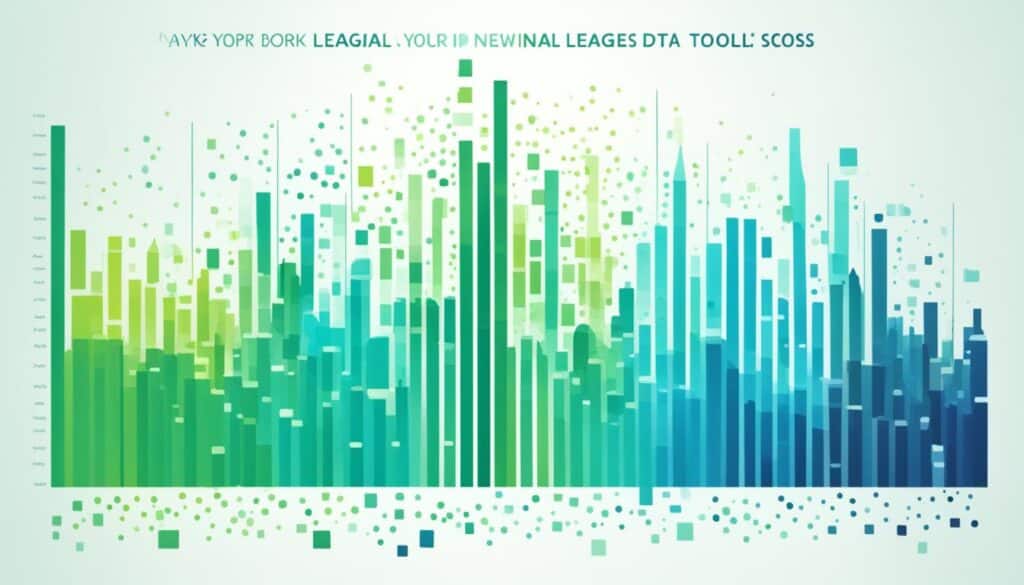The use of legal data and big data analytics is revolutionizing legal practices in New York. This transformative technology is reshaping the way law firms operate by harnessing the power of data-driven strategies to enhance case outcomes and client services.
In today’s digital age, legal professionals in NY are leveraging the vast amounts of legal data available to them. By employing quantitative and analytical skills, lawyers can uncover valuable insights and trends that can significantly impact their decision-making and drive positive results for their clients.
Key Takeaways:
- Big data analytics is transforming legal practices in NY.
- Data-driven strategies optimize profitability and reduce risk.
- Predictive analytics helps make more accurate case outcome predictions.
- Advanced legal research tools streamline the process of finding case precedents.
- Big data enhances decision-making for more informed strategic choices.
The Power of Legal Data Analysis
In today’s digital age, law firms are leveraging the capabilities of legal data analysis to facilitate data-driven strategies that drive success. By harnessing the power of quantitative and analytical skills, lawyers can make more informed decisions to optimize profitability, reduce risk, and enhance the overall client experience.
Legal data analysis allows lawyers to analyze vast amounts of legal data, uncovering valuable insights and trends that can significantly impact case outcomes. By identifying patterns and correlations, lawyers can develop data-driven strategies that lead to positive results for their clients.
Optimizing Profitability
Legal data analysis provides law firms with a deep understanding of their financial performance. By analyzing financial data, law firms can identify areas of growth, assess the profitability of different practice areas, and make informed decisions about resource allocation. This enables law firms to maximize their revenue streams and improve their bottom line.
Reducing Risk
With the integration of legal data analysis, law firms can navigate complex legal landscapes with confidence. By analyzing historical case data, lawyers can identify potential risks and develop strategies to mitigate them. This proactive approach to risk management not only safeguards the interests of clients but also minimizes potential liabilities for the firm.
Enhancing the Client Experience
Legal data analysis empowers lawyers to provide tailored and personalized services to their clients. By analyzing client data, lawyers can gain a comprehensive understanding of their clients’ needs, preferences, and expectations. This allows them to deliver customized strategies, advice, and representation, enhancing the overall client experience and fostering long-term client loyalty.
“Data-driven strategies in the legal industry have the potential to transform the way law firms operate and serve their clients.” – [Expert Name], Legal Data Analyst
By leveraging legal data analysis, law firms can gain a competitive advantage in today’s dynamic legal landscape. The ability to make data-driven decisions based on quantitative and analytical skills enables lawyers to optimize profitability, reduce risk, and provide exceptional client service. Through a comprehensive understanding of legal data, law firms can navigate challenges and seize opportunities, ultimately driving success for both their clients and their practice.

The Benefits of Big Data in Legal Practices
The implementation of big data in legal practices brings numerous benefits. One of the key advantages is the use of predictive analytics, which allows lawyers to make more accurate predictions on case outcomes. By leveraging big data, lawyers can analyze past cases and identify patterns and trends that help them better advise their clients. This data-driven approach enhances decision-making and increases the likelihood of favorable results.
Another significant benefit of big data in legal practices is the availability of advanced legal research tools. Powered by vast amounts of data, these tools streamline the process of finding relevant case precedents. Lawyers can quickly access comprehensive databases, saving valuable time and improving overall efficiency. This not only benefits the legal professionals, but also their clients, who benefit from swift and thorough research.
In addition to predictive analytics and efficient legal research, big data also enables cost efficiency in legal practices. By leveraging data analytics, law firms can identify areas where costs can be reduced or optimized. This data-driven approach allows for better resource allocation and budget management. As a result, law firms can operate more efficiently, ultimately providing cost-effective services to their clients.
Furthermore, the use of big data in decision-making leads to more informed strategic choices. With access to extensive data and analytics, lawyers gain deeper insights into various factors of a case, such as opposing counsel, judges, and jurisdictional trends. This data-driven decision-making process helps law firms develop effective strategies, minimizing risks and maximizing success for their clients.